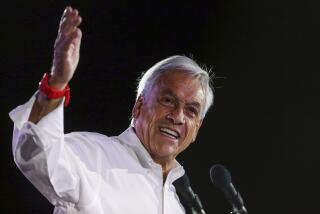Fujimori Lands in Chile, Is Soon Detained
- Share via
SANTIAGO, Chile — Alberto Fujimori, who was Peru’s president for a turbulent decade before fleeing the country amid human rights and corruption charges, was in custody here Monday after a stunning return to the continent from exile in Japan.
Fujimori, 67, was detained at the Marriott Hotel in the Chilean capital after courts here received an extradition request from Lima. He was taken to a police building and later moved to a more comfortable training facility, authorities said.
Fujimori is one of the most colorful and controversial figures in the recent history of South America, and his reappearance on the continent after five years was a jarring event -- as was his arrest several hours after touching down.
In various declarations before his arrest, Fujimori said he had come to Chile to clear the way for his return to Peru and a run at next spring’s presidential election.
“My self-exile is coming to an end,” Fujimori said in a message to the people of Japan, where he has lived for the last five years and was granted citizenship as the son of Japanese immigrants to Peru.
He denounced what he called a campaign of “persecution and defamation without precedent in Peruvian history” against him.
Among the 20 charges against Fujimori are alleged responsibility for a pair of massacres that took a total of 25 lives, misappropriation of funds and subversion of the democratic process. He has called the charges a political vendetta.
He arrived here with a coterie of aides who released photos of his trip and a statement to reporters. He flew in Sunday on a private plane that touched down in Tijuana before arriving in Chile, authorities said. There was some question as to whether Fujimori -- subject of an international arrest warrant -- used his real name on the flight.
The return touched off a flurry of diplomatic and political activity in Lima and Santiago, as officials sought to defuse a potentially explosive situation and pro- and anti-Fujimori protesters took to the streets in both countries.
Peruvian President Alejandro Toledo, who was elected in the aftermath of Fujimori’s reign but has become extremely unpopular, praised Chile for detaining the ex-leader.
Fujimori’s return came at a time when the neighbors are engaged in a sensitive maritime boundary dispute. Diplomats had been looking to calm that controversy when he arrived.
An exasperated Chilean foreign minister, Ignacio Walker, said Fujimori’s action demonstrated “a very imprudent, very irresponsible attitude, considering this is the most difficult week we have had with Peru in the last decade.”
Chilean President Ricardo Lagos voiced the hope that the Fujimori matter would not become “an obstacle in our relations with Peru.”
Peruvian authorities pushed for the extradition to be resolved soon, but Chilean officials stressed that the legal process had to be respected. By some estimates, it could take six months or more for the extradition request to be heard and for Fujimori to exhaust his appeals.
Analysts speculated that Fujimori chose Chile for its proximity to Peru and for the fact that extraditions from Chile to Peru have proved difficult in recent years.
Japan had long resisted extraditing Fujimori because he holds Japanese citizenship.
Fujimori came to power in 1990 at a time when Peru was battling Shining Path, a Maoist rebel group, and experiencing severe financial woes. His supporters credited him with defeating the rebels -- often using ruthless means -- and taming inflation.
He dissolved Congress in April 1992 and staged a coup against his own government, enacting emergency powers, he said, to combat terrorism.
His popularity peaked in September 1992 with the capture at a Lima dance studio of Abimael Guzman, the leader of Shining Path. The group had waged a brutal war against the regime and civilians it deemed collaborators. Guzman remains in custody during his trial.
However, critics say Fujimori’s security services committed gross human rights abuses, including a massacre in Lima’s Barrios Altos neighborhood in 1991 and the kidnappings and killings of nine students and a professor from La Cantuta University in 1992.
Fujimori fled to his parents’ homeland in 2000 when a burgeoning corruption scandal brought his government down. He later resigned the presidency by fax from abroad.
Last month, he declared from Japan that he would run for president, although officials say he is barred from office because of the charges against him. Many disregarded his statement.
In a statement Sunday, Fujimori contended that the Peruvian people had called on him to be a candidate. He remains popular among some right-wing voters, though many other Peruvians revile him.
As Fujimori was being led from one holding facility to another Monday, a group of critics who identified themselves as Peruvian exiles shouted, “Asesino! [Murderer] Asesino!”
*
Special correspondent Vergara reported from Santiago and Times staff writer McDonnell from Buenos Aires. Special correspondent Adriana Leon in Lima and Andres D’Alessandro of The Times Buenos Aires’ Bureau contributed to this report.
More to Read
Sign up for Essential California
The most important California stories and recommendations in your inbox every morning.
You may occasionally receive promotional content from the Los Angeles Times.










